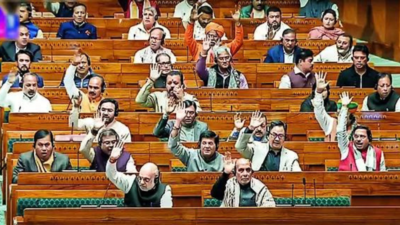Context:
The Union Law Minister has recently introduced two Bills in Lok Sabha to implement the proposed Simultaneous Elections to the Lok Sabha and state assemblies.
More on the News
Two bills were introduced:
- The Constitution (One Hundred and Twenty-Ninth Amendment) Bill, 2024.
- The Union Territories Laws (Amendment) Bill, 2024.
Local body elections are excluded as that will require ratification of the Bill by the legislatures of at least half of all states in the country.
The Bill has been referred to a Joint Parliamentary Committee (JPC), consisting of up to 31 Members of parliaments (MPs), for further review.
About the New Amendments
Amends Article 327 (power of Parliament to make laws on elections to state legislatures): Extends this power to include “conduct of simultaneous elections”.
Appointed Date: The President will bring the provisions of the Bill into force by issuing a public notification on the day of the first sitting of the Lok Sabha after a general election, as per Article 82 A (1).

Curtailing term of State Assemblies: Article 82 (2) states that the term of all legislative assemblies constituted after the appointed date and before the expiry of the full term of the Lok Sabha shall end on the expiry of the full term of the Lok Sabha.
Role of Election Commission of India (ECI): Article 82A (3) mandates the ECI to conduct simultaneous elections to the Lok Sabha and all legislative assemblies.
Postponement of Elections to State Assemblies: Article 82A (5) provides that the President can postpone elections to a legislative assembly if the ECI believes that the said election cannot be conducted along with the election to the Lok Sabha. As per Article 82A (6), the term of the said assembly, when constituted, will end with the full term of the Lok Sabha elected in the general election.
Defines Mid-Term Election: Article 83 (7) states that the election for constituting the Lok Sabha for its unexpired term shall be referred to as a mid-term election.
Provisions for Lok Sabha elected via Mid-Term Election: As per Article 83 (5), the Lok Sabha elected via mid-term election shall continue only for the unexpired term of the previous House. Article 83 (6) states that this Lok Sabha will not be a continuation of the previous House, and all the consequences of dissolution shall apply to the dissolved Lok Sabha.
- For example, a Bill pending in the dissolved Lok Sabha will expire and will have to be introduced again in the new House.
| Arguments in Favor of ONOE | Arguments Against ONOE |
| · Cost Concerns: Frequent elections increase costs for the government and political parties, straining finances. Simultaneous elections would reduce these costs. For example, the 2014 general elections cost ₹3,870 crore. | · Federalism Conflict: ONOE undermines the principle of federalism by treating the entire nation as one, reducing the autonomy of individual states. |
| · Model Code of Conduct (MCC): Frequent imposition of the MCC causes policy paralysis, slowing down development programs. | · Threat to Multi-party Democracy: ONOE may benefit larger national parties, reducing the diversity of political representation and disadvantaging regional parties. A 2015 study found a 77% chance that the winning political party or alliance will win both the Lok Sabha and Assembly elections” in that state when held simultaneously. |
| · Uncertainty and Instability: Asynchronous elections cause uncertainty, disrupt supply chains, deter business investments, and hinder economic growth. | · Accountability and Representation: ONOE risks blending state and national issues, reducing voter representation and accountability by addressing different issues in one election. |
| · Voter Fatigue: Staggered elections lead to voter fatigue, reducing voter turnout and participation. | · Constitutional Hurdles: Amending the Constitution and the Representation of People Act (1951) would require broad consensus among all parties, making it difficult to implement. |

